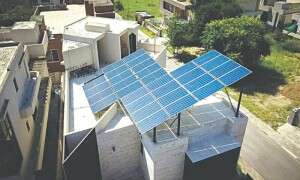KYIV: Russian troops on Friday seized the biggest nuclear power plant in Europe after a middle-of-the-night attack that set it on fire and briefly raised worldwide fears of a catastrophe in the most chilling turn in Moscow’s invasion of Ukraine yet.
Firefighters put out the blaze, and no radiation was released, UN and Ukrainian officials said, as Russian forces pressed on with their week-old offensive on multiple fronts and the number of refugees fleeing the country topped 1.2 million.
While the vast Russian armored column threatening Kyiv appeared stalled outside the capital, President Vladimir Putin’s military has launched hundreds of missiles and artillery attacks on cities and other sites around the country, and made significant gains on the ground in the south in an apparent bid to cut off Ukraine’s access to the sea.
In the attack on the Zaporizhzhia nuclear plant in the southeastern city of Enerhodar, the chief of the UN’s International Atomic Energy Agency, Rafael Mariano Grossi, said a Russian projectile hit a training centre, not any of its six reactors.
Putin’s military launches hundreds of missiles, artillery attacks on cities across country
The attack evoked memories of the world’s worst nuclear disaster, at Ukraine’s Chernobyl. In an emotional nighttime speech, Ukrainian President Volodymyr Zelensky said he feared an explosion that would be the end for everyone. The end for Europe. The evacuation of Europe.
But nuclear officials from Sweden to China said no radiation spikes had been reported, as did Grossi. Authorities said that Russian troops had taken control of the overall site but that the plant staff continued to run it. Only one reactor was operating, Grossi said in the aftermath of the attack.
Two people were injured in the fire, Grossi said. Ukraine’s state nuclear plant operator Enerhoatom said three Ukrainian soldiers were killed and two wounded.
The crisis at Zaporizhzhia unfolded after Grossi earlier in the week expressed grave concern that the fighting could cause accidental damage to Ukraine’s 15 nuclear reactors at four plants around the country.
Severing Ukraine’s access to the Black Sea and the Sea of Azov would deal a severe blow to its economy and could worsen an already dire humanitarian situation.
A round of talks between Russia and Ukraine yielded a tentative agreement on Thursday to set up safe corridors to evacuate citizens and deliver food and medicine. But the necessary details still had to be worked out.
The UN human rights office said 331 civilians had been confirmed killed in the invasion but that the true number is probably much higher.
Inside Ukraine, frequent shelling could be heard in the center of Kyiv, though more distant than in recent days, with loud thudding every 10 minutes resonating over the rooftops.
Ukrainian presidential adviser Oleksiy Arestovich said battles involving airstrikes and artillery continued northwest of Kyiv, and the northeastern cities of Kharkiv and Okhtyrka came under heavy fire. He said Ukrainian forces were still holding the northern city of Chernihiv and had prevented Russian efforts to take the important southern city of Mykolaiv. Ukrainian artillery defended Odesa from repeated attempts by Russian ships to fire on the Black Sea port, Arestovic said.
Another strategic port, Mariupol on the Azov Sea, was partially under siege, and Ukrainian forces were pushing back efforts to surround the city, Arestovich said.
The humanitarian situation is tense, he said, adding that Ukrainian authorities were in talks with Russian representatives and international organisations to set up a humanitarian corridor to evacuate residents and supply food.
Battles have knocked out the city’s electricity, heat and water systems, as well as most phone service, officials said.
Published in Dawn, March 5th, 2022

















































